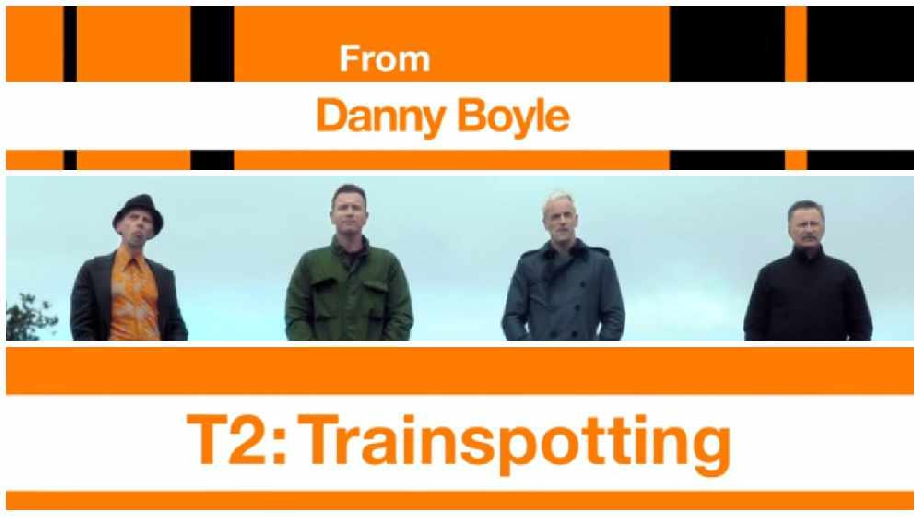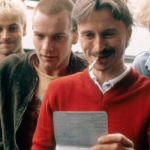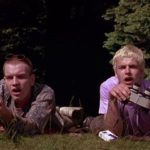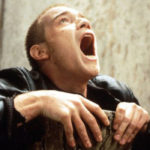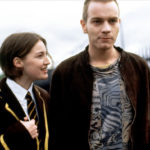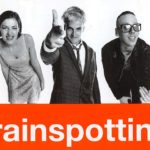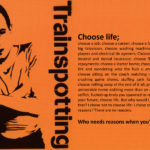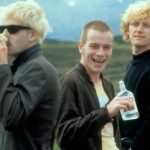“Trainspotting was nostalgic and ridiculous but pretty brilliant. It was like a memorial service for the first film, but on cocaine and pure caffeine. Quote that” – Adam Millward (my son!)
Let us begin at the beginning, to coin a renowned phrase. In 1996 Danny Boyle‘s Trainspotting hit British cinemas like a steam train. I saw, loved and reviewed (see here.) The sheer energy and exuberance of the film won it many fans, not to mention the depiction of a certain slice of youth culture. It sure earned its 18 certificate, but everyone wanted to see it. Want to know how highly this film was esteemed? Wikipedia:
The film has been ranked 10th by the British Film Institute (BFI) in its list of Top 100 British films of all time. In 2004 the film was voted the best Scottish film of all time in a general public poll.
That the film adaptation of Irvine Welsh‘s book (written in Scottish dialect) fizzes with visual invention many could relate to, is actually an anti-drug film is at face level counterintuitive. Rather than lecturing viewers, it took the trouble to explore why junkies loved shooting up; next, it factually explained the realities of being a heroin addict; then, only then does it hit us between the eyes by displaying graphically the full horrors and violence, destroying families and creating havoc in society associated with hard drugs.
Oh yes, and it’s in the form of a knockabout buddy black comedy many viewers, even the respectable viewers shocked by the coarse language, casual violence and explicit drug use, could relate to – that and the general air of underlying melancholy about lives ruined and characters struggling metaphorically for breath. The jokes are great, despite everything.
Of course, it is strong meat and not the sort of film everybody could relate to easily (my son found the drug-taking difficult to bear when he was old enough to see the film), but such was the popular following and iconography (the poster on a thousand student bedroom walls) the film, its characters, its visuals, its soundtrack and its sheer chutzpah created that you would expect a string of sequels to follow on, for had this been Hollywood that’s what you would get, sure as eggs is eggs.
Not on planet Boyle. Welsh wrote the sequel Porno in 2002, set 20 years on from the original book – but Boyle waited until 20 years had passed and the characters were therefore 20 years older before making his sequel and, for familiarity’s sake, naming it T2: Trainspotting, very definitely NOT “Trainspotting 2.”
The passage of time allowed long-time screenwriter collaborator John Hodge (who also adapted the original Trainspotting) to come up with 8 redrafts before the concept matured into a script worth filming; also for the rocky relationship between Boyle and McGregor to be soothed sufficiently to allow further collaboration. The effect of time on the cast and characters will follow.
This is not however a straight adaptation of Welsh’s book, though those who have read the book tell me there are more than a few nods and some great gags filleted from Welsh, plus a related narrative devised by Hodge and Boyle in the inimitable fashion of the master. Stylistically the sequel has calmed down a tad, but is still unmistakably Welsh in origin, albeit not as inky black and cynical as the film adaptation of his novel Filth, for example.
Whether or not you can forget about the past lives of Mark Renton (Ewan McGregor), Simon “Sick Boy” Williamson (Jonny Lee Miller), Daniel “Spud” Murphy (Ewen Bremner), Francis “Franco” Begbie (Robert Carlyle) – who is a sociopath rather than a reformed junkie, a different sort of addiction. While drugs is what we expect of them, just as we expect rock stars of yore to perform their greatest hits 20 years on. Once an addict, always an addict, even if Simon has progressed from H to snorting cocaine?
Well, yes and no. While the quartet of actors have all moved on, the characters are still struggling on the same treadmill on the fringes of society. To a large extent this sequel feeds off the frozen motion as the quartet struggle to stand still, complete with Super-8 flashbacks of the boys as kids and later shooting up, reminding us of the pleasure and the pain they have given us.
This time, the main theme is an analysis of the complex and entwined relationships between the four and the impact of the passage of time, though its notable that the same character flaws explored at great lengths in the first film surface again rapidly.
- Renton, the most capable of the four and the most likely to kick-start his life towards respectability, working in Amsterdam apparently with a decent job, a wife and children – though it soon transpires that even that facade is built on lies. He returns to Scotland to make peace with his friends, while slightly unprepared for the welcome.
- Sick Boy, now restored as Simon, is a failed chancer who is still scamming, has not forgiven his best friend Renton but loves as much as hates this friend. Theirs is a series of soaring highs and harsh lows. This time his schemes include blackmailing a respectable deputy head teacher whose thrills come from being humiliated by Simon’s Eastern European sometime girlfriend and “business partner” Veronika. As with all things, he fails.
- Spud has come off H, made a life but then lost everything and went back to the skag. He is still wrestling with the aftermath of addiction – drugs have trashed his existence. We first see him attempting suicide, rescued by Renton in a scene that had me cringing at the exquisite comic horror. However, there is redemption: arguably the greatest success of T2 is Spud finally, finally finding his voice and making his presence felt – largely through writing but also through a plot twist I won’t mention.
- Begbie is still a sociopath, in prison for murder and thirsting for revenge on Renton, but succeeds in escaping and re-acquainting himself with his family and friends. His big joke is with his manhood, such that Begbie steals a load of Viagra pills and pops them like sweets in a nightclub. While there he encounters and chases Renton, resulting in some violence… and only then does Begbie discover his hard-on.
The success of T2: Trainspotting is largely built upon the glorious ensemble of four superb actors playing of this quartet. As my partner pointed out, there was not a hint of grandstanding but the interactions rang so true you could not help but see them as real people. Carlyle possibly stands out by virtue of the fact that Begbie is utterly menacing throughout, to the extent that even in a glass meeting room armed with a panic button, his parole officer looks terrified, but the minutae of the acting process demonstrates hidden depths to each of the four.
We also see the return of Diane Coulston (the wonderful Kelly Macdonald), who was originally a schoolgirl and occasional underage girlfriend for Renton, now a solicitor thanks to a delicious twist, and Shirley Henderson‘s Gail Houston – Spud’s ex. Also worthy of a mention is a cameo for James Cosmo as Renton’s dad in a long overdue reunion, a fine actor I reviewed recently for his performance alongside Carlyle in the Legend of Barney Thomson.
To succeed as a film in its own right, T2:T had to find new space and dimensions. But where the original film was a stylised breeze through lives lived under the spell of drugs with a skirmish of plot added to provide edge, the second has an even briefer narrative, loosely relating to Simon’s plans to convert an Edinburgh pub he has inherited into a brothel with help from a government grant and Veronika.
Remember the motif of Archie Gemmill’s World Cup Goal against Holland in 1978? This time it’s Georgie Best that is feted, so a nod but the same principle. Maybe that’s the trend: not too far different but just more of the same?
Some reviewers have described it as more a caper than the original, though I would disagree. A homage maybe, one that shows plenty of signs of life, but not a caper – more a character study with some moments effervescing with comic invention.
Best is when Simon and Renton choose to slip into a Unionist club to filch credit and debit cards from coats and wallets while songs are sung. Sadly for them, the doorman stops them until they have sung a song in a scene that had me crying with laughter in spite of the slightly horrific mention of Scottish sectarianism alive and kicking. But guess what: the pay-off to this scene was better still, literally and metaphorically (go see the film and you’ll see what I mean!)
Despite such joyous moments, the mood of T2:T is slightly melancholic, with good reason. Rotten Tomatoes gives the film a solid 82% and says in consensus:
“T2 Trainspotting adds an intoxicating, emotionally resonant postscript to its classic predecessor, even without fully recapturing the original’s fresh, subversive thrill.”
Nail on head – it is a film with emotion and longing for the past. As my son rightly says, it is a memorial service for the original, but worth seeing unless you are sick of drugs and violence. In this case they are entirely justifiable and essential to the credibility of plot and characters, most certainly not gratuitous.

